Why do Ashkenazi Jews name babies after deceased relatives? A rabbi responds.
A person’s soul lives in us when we invoke their values and their life story

Graphic by Midjourney
Have you ever looked at a child and seen not only the soul in front of you but also someone you loved and lost?
When my mother died at the age of 44 from a sudden brain aneurysm, I struggled with remembering her as she lived. The last images in my mind were her final days in the hospital.
Thank God, slowly, beginning with the funeral, shiva and in the years since, I have learned to celebrate her life, cherish her love, mine the moments we shared and channel her values.
As a rabbi guiding families through tragedy, I know my journey is not unique. We all grapple deeply with the suddenness of loss and seek ways to immortalize and honor someone who is no longer physically with us, but we know in our hearts lives in us and through us.
In Ashkenazic tradition, one of the greatest expressions of love is naming a newborn in memory of someone who has passed away. A name in Judaism is not merely a form of identification, but an opportunity to manifest the soul of a loved one who is no longer physically present.
When I married my wife, Diane, and we had our first child, we named her Sara Malka, after my mom. In those moments, we knew spiritually it was the right thing to do to elevate my mother’s spirit. But recently the magnitude of this gesture blew me away.
My daughter Sara Malka is now in her early 30s, married with three children of her own. I asked her how her name impacted her and she shared with me:
“I have a sense that your mother is always with me and watching over me. I know that she liked being Jewish and grew in her faith and observance and that has helped strengthen my connection to God. I think about her as a mom and how she was so welcoming to people. I really feel she is with me.”
It is awe-inspiring when I think of how a choice of a name can be mainly woven into my daughter’s life. My mother, of blessed memory, serves as a guardian angel for my daughter and enriches my daughter’s life with deeper meaning and purpose.
Fueling generations to come
It did not happen by accident. It is not simply enough to bestow a name on a child or grandchild in the hopes that the memory of a loved one lives on. A person’s soul lives in us when we invoke their values and their life story. We speak of my mother often; every year I mark her yahrzeit and reflect on her spirit.
When meeting with b’nai mitzvah families, I encourage the young person to learn about who they are named and write about that person. Our names can serve as a North Star connecting us to our past, present and future.
Naming a newborn can also align a child with the destiny of Israel and the Jewish people. In fact, since Oct. 7, many newborns have been named Beeri, Nir, or Oz, after kibbutzim that were affected.
Our youngest daughter, Shalhevet, was named in memory of the baby Shalhevet Techiya Pas, daughter of Yitzchak and Oriya Pas, who was murdered in Hebron in Israel on March 26, 2001. We did not know the family personally, but felt moved to connect our family, and specifically our youngest child, to the destiny of this holy city and our people.
When she became a bat mitzvah, we visited Hebron. Yitzchak Pas spoke to our family. He expressed his gratitude for creating another light for his daughter through our daughter. We did not know each other, but the souls of his child and ours were bound and blessed forever.
Shalhevet is now a senior at Stern College and planning on moving to Israel in summer 2025. When I asked her what her name meant to her, she replied: “Shalhevet did not have the chance to grow up, experience the beauties of life, forge relationships, and explore the world — I can only hope to make her proud by making the most of the life I have been given.”
Shalhevet Pas lives in and through our daughter Shalhevet.
Souls soar when we bestow a name on a newborn in memory of a person and elevate their values in our lives. We should all channel the light of those who came before us and fuel their souls for many generations to come.
















